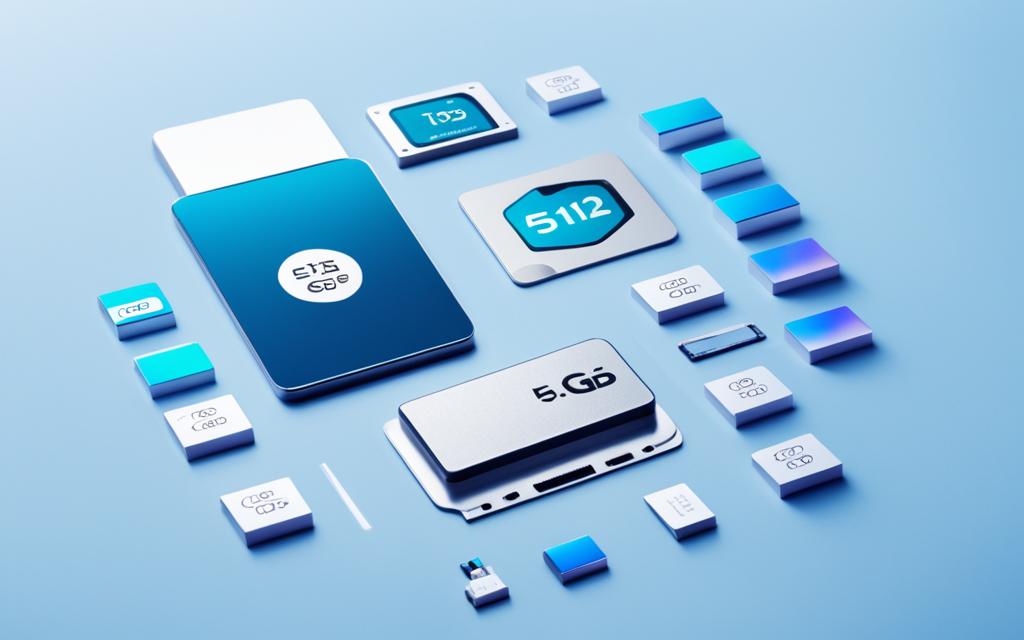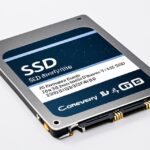Table of Contents
A 512GB SSD is a solid-state drive with 512 gigabytes of storage. Unlike traditional hard disk drives (HDDs), SSDs are faster and more reliable. On Windows, a 512GB SSD gives you about 476GB of real space to use1.
This reflects nearly half what a 1TB hard drive offers. Knowing the value of a 512GB SSD means seeing its power to store data well and boost your computer’s speed. This piece delves into SSD tech, spotlighting the 512GB SSD benefits for gaming and work tasks.
Key Takeaways
- 512GB SSDs offer substantial storage capabilities for everyday tasks.
- They provide enhanced performance and durability compared to traditional HDDs.
- Typical usable space on a 512GB SSD is approximately 476GB on Windows systems.
- These drives can accommodate multiple games, applications, and media files.
- Understanding their advantages helps in making informed purchasing decisions.
- Upgrading to larger SSDs can significantly improve storage flexibility.
What is an SSD?
An SSD, or solid-state drive, uses flash memory to store data without power. It means quicker access to your files than with old hard drives. These drives don’t have moving parts. They work faster and are more reliable because of this. SSDs start up your computer in no time and transfer files quickly, making them better for new tech needs23.
Differences Between SSDs and HDDs
SSDs and HDDs are different in how they’re built and perform. HDDs have spinning disks and heads for reading/writing, while SSDs don’t. SSDs use a special type of memory that makes them tougher and more reliable. They’re less likely to get damaged if dropped2.
Also, SSDs use less electricity and stay cooler than HDDs. This makes them more energy-efficient for all types of devices23.
Key Components of an SSD
Looking at SSD components helps us understand how they work. The key parts are:
- Flash Controller: Manages the data flow within the SSD.
- NAND Flash Memory Chips: Store the actual data securely.
- Interface: Decides the speed and connectivity (e.g., SATA, NVMe).
- Firmware: Keeps the drive running smoothly.
What Does 512GB SSD Mean?
When we talk about 512GB SSD, we’re discussing a solid-state drive with 512 gigabytes for storing. This is a lot of space for your files, apps, and more. But, it’s key to know that the actual space you get is around 476 GiB. This is because of how operating systems calculate storage.
Understanding Storage Capacity
The term SSD storage capacity refers to the max data you can keep on it.
The reason for discrepancies in actual space is how manufacturers define sizes. They may use binary or decimal measurements. Knowing the difference between these can really change how you view your storage, especially with a 512GB SSD.
Binary vs Decimal Measurement
Since computers work in binary, understanding storage can be tricky.
Traditionally, 1GB is seen as 1,000,000,000 bytes in decimal terms. But, in binary, 1GiB equals 1,073,741,824 bytes. This difference is why a 512GB SSD doesn’t offer as much space as you might expect. Learn more about this at binary vs decimal.
Grasping these differences helps set realistic expectation for a 512GB SSD’s capacity. By understanding binary vs decimal measurements, you enhance your storage efficiency4.
Advantages of Choosing a 512GB SSD
A 512GB SSD offers many compelling benefits over traditional hard drives. It boosts performance significantly, showing impressive speed, especially in reading and writing data.
Faster Read and Write Speeds
SSD technology stands out for its speed. These drives boot systems much faster, up to 15 times quicker than old HDDs5. PCIe 4.0 SSDs can reach data transfer speeds up to 64,000MB/s. That’s much faster than the 600MB/s limit of SATA III5. This speed makes applications start quicker and the system more responsive.
Durability and Reliability
SSDs are very durable. They have no moving parts, so they’re less likely to be damaged by shocks or wear and tear5. This means there’s a lower chance of losing your data. The 512GB SSD’s tough build is great for laptops6.
Energy Efficiency
Energy efficiency is another big plus of SSDs. They use less power because they don’t have moving parts. This means your laptop’s battery lasts longer. It’s a smart pick for people who need efficiency and portability.
How Much Storage Does 512GB Provide?
The storage capacity of 512GB holds lots for various uses and files. It meets many user needs. Knowing typical file sizes shows how much you can store. It’s clear 512GB is good for many usage scenarios, like gaming and creative work.
Typical File Sizes
Digital files are getting bigger, so knowing what fits in 512GB is key. Operating systems like macOS Ventura and Windows 11 need 20-25GB each7. This means space reduces after installing them. On a 512GB SSD, you might store:
- 8 to 10 games of 30-50GB each
- 128,000 photographs of 4MB each
- About 400 different applications
Common Usage Scenarios
How people use a 512GB SSD varies. Photographers can save thousands of photos. Gamers get enough space for many games. But, professionals with big files or software development might need more space.
Many laptops start at 256GB but go up to 2TB7. Thus, 512GB is a nice middle ground for speed and space. Those using cloud and external storage will find it enough for daily tasks while keeping speeds up.
| File Type | Typical Size | Approx. Quantity on 512GB |
|---|---|---|
| Operating System | 20-25GB | 1 |
| Modern Video Game | 30-50GB | 8-10 |
| Photograph (4MB each) | 4MB | 128,000 |
| Application | Varies | ~400 |
Understanding these points helps users see the benefits of 512GB. It’s key to know your needs and how you’ll use it7.
Is 512GB SSD Enough for Gaming?
As games grow bigger and demand more game storage requirements, many wonder if 512GB SSD is enough for gaming. Typically, each game needs 30GB-50GB, so a 512GB SSD can hold about 8-10 games8. This might be okay for those who play occasionally. But for bigger games, like Call of Duty: Modern Warfare, which need over 200GB, it’s a tight squeeze9.
Game Sizes and Storage Requirements
The gaming world is quickly changing, with new games needing more space. Gamers often play many games and like to keep a lot of them available. So, having enough space is key. A 1TB SSD looks like a good choice for fitting several new games easily. Also, while some gamers like to keep just a few games, others love a big selection8.
Future-proofing Your Storage
For those serious about gaming, choosing a future-proof SSD is a wise move. SSDs are faster than HDDs, offering quicker load times and smoother gameplay. Thinking about NVMe SSDs is clever because they’re even faster than regular SSDs8. With gaming consoles also moving to NVMe, it’s smart to upgrade for the best experience9.
Comparing 512GB SSD to Larger Capacities
Choosing between a 512GB SSD and bigger ones like 1TB boils down to cost and what you need. A 512GB SSD usually costs less, making it great for those on a budget. Yet, when you delve into the cost of SSDs, it’s clear there’s more value for those with a lot of data.
Cost Considerations
Price matters a lot when it comes to storage for buyers. A bigger SSD, like a 1TB model, often has a better price for each gigabyte. This makes it a better deal for those needing lots of room. Even though SSDs cost more than HDDs, sometimes by up to 2.5 times, it’s important to think about what storage you really need before upgrading10.
Price-Per-Gigabyte Analysis
Looking at the price analysis helps us understand costs better. A 512GB SSD can be priced from £50 to £100. But, 1TB SSDs might cost between £100 and £180. Here’s a table showing price comparisons:
| SSD Capacity | Typical Price (GBP) | Price-Per-Gigabyte (GBP) |
|---|---|---|
| 512GB | £50 – £100 | £0.10 – £0.20 |
| 1TB | £100 – £180 | £0.10 – £0.18 |
In the end, a 512GB SSD provides enough space for many. Yet, a larger SSD can be better in the long run. Whether for gaming, storing files, or heavy-duty apps, comparing 512GB vs 1TB SSD helps in making a smart choice. This fits personal or business needs well.
Types of 512GB SSDs Available
Choosing the right 512GB SSD requires knowing the options available. The key factors to consider are the SSD’s different shapes and technology. Both greatly affect how they perform and work with other computer parts.
Form Factors: M.2 vs 2.5-inch
SSDs come in shapes important for how well they fit and work. M.2 drives stand out for their small size. This lets them connect closely to the motherboard. This close connection cuts down delay, boosting speed11. They’re made in various lengths, fitting many computer setups. M.2 types, especially NVMe ones, reach speeds over 5000 MB/s11.
On the other hand, 2.5-inch SSDs follow a more classic shape, often used to replace old hard drives. They fit well with older computers but usually can’t go as fast as M.2s, especially the NVMe models.
Technology Types: SATA vs NVMe
Choosing between SATA and NVMe affects how fast an SSD can move data. SATA SSDs, the longtime standard, provide speeds up to 550-600 MB/s12. NVMe has changed the game recently. It delivers data up to four times faster than SATA. This makes NVMe the best pick for gaming and software that needs fast data access11.
NVMe also shines in handling more data operations at once. It can manage up to 64,000 commands in a single queue. This shows it’s much better at processing data than SATA11.
| Feature | M.2 SSD | 2.5-inch SSD |
|---|---|---|
| Size | Compact, varied lengths | Standard size 2.5 inches |
| Interface | SATA or NVMe | SATA |
| Speed | Up to 5000 MB/s (NVMe) | Up to 600 MB/s (SATA) |
| Usage | High-performance applications | General usage, upgrade for HDDs |
Knowing about types of 512GB SSDs helps users find the best fit for their computing requirements. This boosts both their system’s speed and how well parts work together12.
Conclusion
A 512GB SSD shines as a powerful storage solution. It perfectly combines speed, reliability, and energy saving. SSDs have speedy file access and are more durable because they don’t have moving parts. Compared to HDDs, they are a step ahead13. Their performance is top-notch, especially when you need fast data access14.
For those making decisions, knowing the difference between storage options is key. Even though SSDs might cost more per gigabyte, they’re worth it for their speed and reliability15. Switching to SSD technology improves your experience right away. It also prepares you and your team for the future, keeping you ahead as software needs increase.
Choosing a 512GB SSD means you’re setting yourself up for success in today’s fast-paced digital world. It’s not just about getting more storage. It’s about keeping up with technology and making sure you stay productive.
FAQ
What is the difference between an SSD and an HDD?
SSDs and HDDs differ in how they are built and perform. SSDs use flash memory with no moving parts. This makes them quicker and more reliable. On the other hand, HDDs have spinning disks and are slower, with a higher failure risk.
How much usable space does a 512GB SSD provide?
A 512GB SSD shows as around 476 GiB of space on Windows, due to binary and decimal measurement systems.
What are the main benefits of choosing a 512GB SSD?
Choosing a 512GB SSD brings many benefits. You’ll see faster start-up times and quicker file transfers. They are also more durable and use less energy than regular hard drives.
Can a 512GB SSD accommodate modern video games?
Definitely. With a 512GB SSD, you can store about 8 to 10 modern games. Games usually need 30GB to 50GB each, but some need more space due to their complexity and high-quality graphics.
How do I decide between a 512GB SSD and a larger capacity SSD?
Choose based on your storage needs and budget. While 512GB is cost-effective, larger SSDs can be better for those with lots of data.
What are the different types of 512GB SSDs available?
There are many 512GB SSDs out there, each with different features. Types like M.2 and 2.5-inch differ in performance. M.2 connects directly to the motherboard for better performance. NVMe drives are faster than SATA ones.
Is 512GB SSD suitable for professional tasks?
Yes, a 512GB SSD meets the needs of professionals. It’s great for tasks like editing photos and videos, developing software, and running office apps. It provides speed and reliability for your work.
Source Links
- https://www.minitool.com/partition-disk/is-512gb-ssd-enough.html – Is 512GB Enough? If Not, Upgrade to a Larger SSD Manually
- https://www.tobiasholm.com/tech/512gb-ssd-vs-1tb-ssd – 512GB SSD vs 1TB SSD – Which Is Best for You?
- https://www.avast.com/c-what-is-ssd – What Is a Solid-State Drive (SSD)?
- https://www.kingston.com/en/ssd/what-is-nvme-ssd-technology – What is NVMe SSD technology? – Kingston Technology
- https://www.kingston.com/en/blog/pc-performance/benefits-of-ssd – The 5 Benefits of SSDs over Hard Drives- Kingston Technology
- https://jmetz.com/2019/11/from-quora-what-is-better-512gb-sdd-1tb-hdd-256gb-ssd-or-512gb-ssd-32gb-optane/ – From Quora: What is better? 512GB SDD, 1TB HDD + 256GB SSD, or 512GB SSD + 32GB Optane?
- https://www.gearpatrol.com/tech/a719946/how-much-laptop-storage-do-you-need/ – How Much Laptop Storage Do You Really Need? | Gear Patrol
- https://www.gamepro.com.au/faqs/512gb-ssd-enough-for-gaming/ – Is 512GB SSD Enough For Gaming? | FAQs • GamePro
- https://www.intel.com/content/www/us/en/gaming/resources/ssd-improves-gaming-experience.html – How SSDs Impact Gaming – Intel
- https://www.crucial.com/articles/about-ssd/ssd-vs-hdd – SSD vs HDD: Know the Difference
- https://www.crucial.com/articles/about-ssd/m2-with-pcie-or-sata – NVMe vs M.2 vs SATA vs PCIe: What are these SSDs?
- https://en.wikipedia.org/wiki/Solid-state_drive – Solid-state drive
- https://discussions.apple.com/thread/5458538 – 1TB Fusion vs 512GB SSD… any experience?
- https://aws.amazon.com/compare/the-difference-between-ssd-hard-drive/ – SSD vs HDD – Difference Between Data Storage Devices – AWS
- https://wpengine.com/resources/what-is-ssd-storage/ – What Is SSD Storage? | WP Engine®








